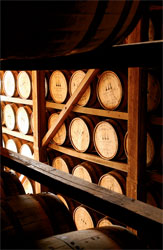 |
|---|
| Talking Turkey
Jimmy Russell, at 71 the dean of bourbon’s master distillers, reports daily to the Wild Turkey Distillery in Lawrenceburg, unless he’s on the road promoting his product and his industry. He carries a bit of a paunch these days, but Russell can still negotiate the steep, narrow stair in the warehouses to tap into barrels filled with aging whiskey, either to assess their readiness for bottling or to find the best casks for Russell’s Reserve, his signature brand. His mirthful eyes and easy laugh make him an approachable ambassador for Kentucky’s whiskey. Here are a few comments from the most experienced of the state’s bourbon-makers, who grew up just five miles from his distillery.
Bruce Allar: What has changed in the bourbon industry over the past 50 years?
Jimmy Russell: When I started ? 1954, September the 10th is when I started ? it was a lot smaller, and there were a lot more distilleries at that time too. I expect there were 40-some-odd bourbon distilleries then. We had four here in Anderson County at that time, Frankfort had Old Crow, Old Grand-Dad and Old Taylor, and there were lots of others in Louisville. We had the same type of still as we have now, except now it’s a little bigger. We had a four-foot-diameter still then with 19 stripping plates and a bubble cap on the top of it; now it’s five feet in diameter with 19 stripping plates and a bubble cap on top of it.
BA: It sounds like things have remained pretty constant at Wild Turkey.
JR: We’re doing everything the same way as we were doing when I started, except one thing: Everything then was run by hand. The people that ran the still would sit there with one hand on the pump, pumping flow into the still, and the other one on the steam valve to control the temperatures and everything. And nowadays we still have a person on there, but they’ve come up with better equipment and (automatic) controls.
BA: Wild Turkey’s former master distiller, Bill Hughes, trained you, but how else did you learn the job of distiller?
JR: Usually in the distillery business, where you start that’s where you stay. We have people who’ve been here over 30 years ? if they start in the warehouse or in bottling or in the distillery, they stay there. I started in the distillery in the lab, doing sampling. I’d check grain samples for moisture and everything. I would learn one job really well and be about ready to take it easy; then they’d transfer me to another job. I didn’t know what they were doing, but I ended up with experience at every place in the plant. . . . There are so many things in the production /files/storyimages/of it that the only way you can get them is on-the-job training.
BA: What are the trickiest parts of the process?
JR: The grain and the distillation proofs (percent of alcohol). If the grain is bad, I don’t care how good a job you do in distillation and everything, the taste is gonna be off. We distill at a lot lower proof than most everybody does because it’s like steak: How many people eat a good steak well done? The higher (proof) you distill anything, the less flavor you have.
BA: Your son Eddie is in line to be Wild Turkey’s next head distiller and your father worked in the industry. Some of your ancestors are English-Irish. Did they make whiskey in the old days?
JR: Probably, but it wasn’t legal. |


